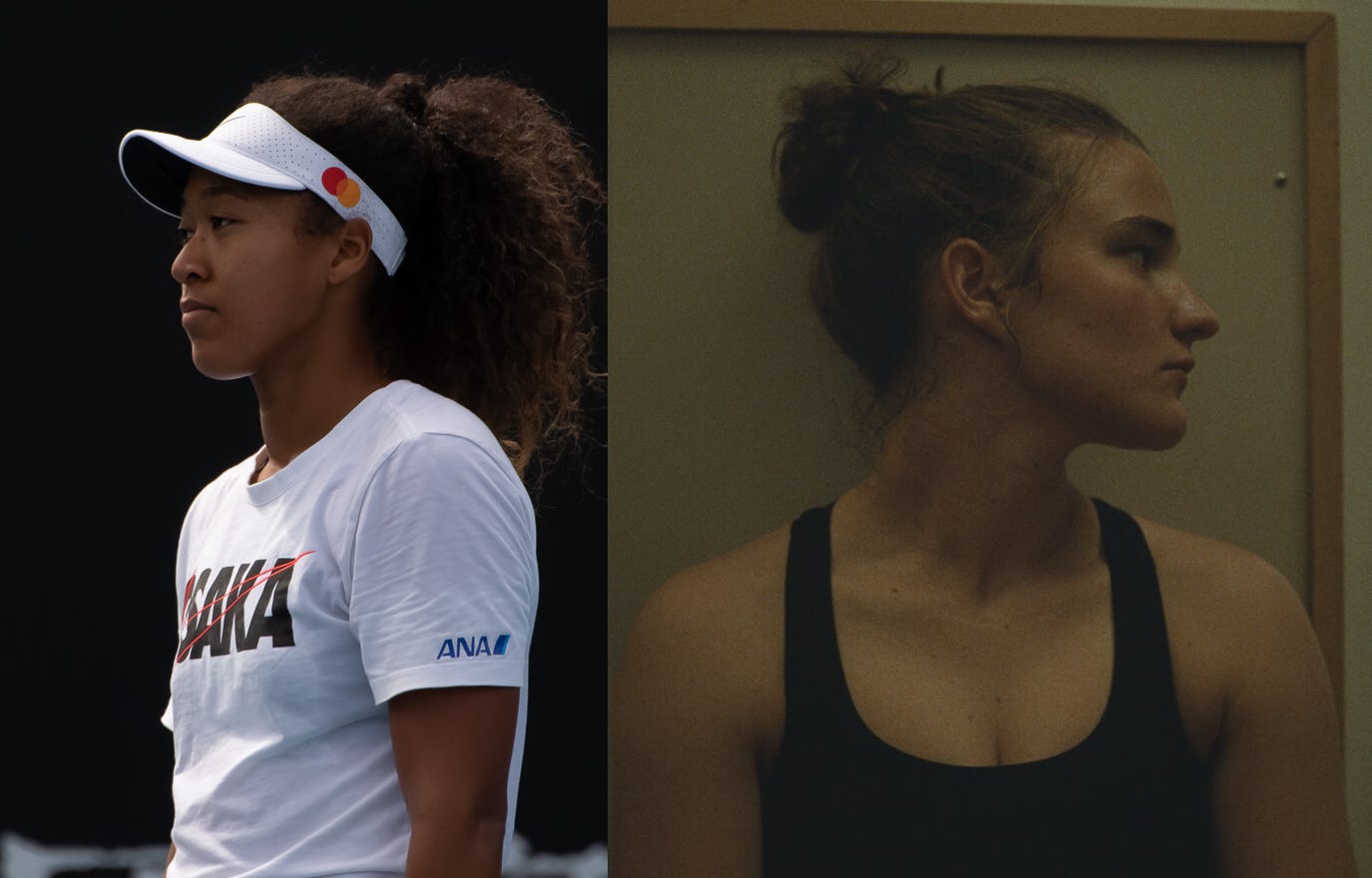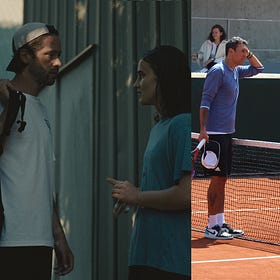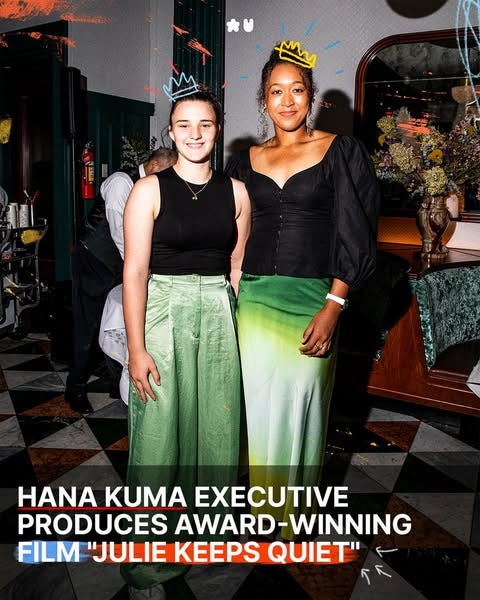Naomi Osaka on When Julie—and Tennis—Keep Quiet
An interview with executive producer Naomi Osaka on the culture of silence in tennis: "You just hear things about people."

After a relative dearth in the genre, there’s been a proliferation of movies foregrounding tennis in recent years, with Battle of the Sexes (2017), King Richard (2021), and Challengers (2024) being the obvious standouts. Those buzzy, big-budget movies were joined in recent months by Julie Keeps Quiet (Julie Zwijgt), a Belgian arthouse film movie that debuted at Cannes last year and was later Belgium’s submission to this year’s Oscars.
Bounces readers may recall that Lindsay Gibbs of Power Plays and I used Julie Keeps Quiet as a framing device back in January, discussing parallels between the movie, which is about a 15-year-old girl whose former coach is being investigated for abusing the girls he’s coached, and the unfolding story of the WTA’s investigation of abuse by Stefano Vukov, the coach of Elena Rybakina.
Rally: How We Talk About Silence in Tennis
This is a collaborative cross-post conversation between Bounces, a new tennis-focused outlet by Ben Rothenberg, and Power Plays, a no-bullshit newsletter about sexism in sports by Lindsay Gibbs.
Vukov, as you’ve likely heard, was eventually handed a one-year ban by the WTA. Rybakina has continued training with him, however, on private courts where the WTA does not have jurisdiction. It remains an uneasy, complicated situation, and one that I have more reporting on coming in the future.
But despite Vukov being the newsier angle, I still wanted to double back to Julie Keeps Quiet one more time as the movie trickles in and out of theaters worldwide. It’s been admittedly tricky to figure out when to publish this piece because Julie Keeps Quiet has had a slow rollout; the movie has been trickling out to theaters around the U.S. in past weeks, as well as making its debut in UK theaters later this month. Stateside streaming plans have not yet been announced.
Though it may take some effort, I think it’s worth seeking out on several fronts. Julie Keeps Quiet’s subject matter is heavier than any tennis movie I’ve seen before, but in a way that I think fills in a big missing piece in the tennis-on-screen landscape.
If you’re someone who is concerned about tennis’s culture of silence, or the vulnerability of girls in the men-dominated world of elite sports, there’s a lot here to digest.
If you are someone who can appreciate a quiet, slow-paced, subtle subtitled arthouse movie, you will feast here.
And if you have struggled to get into past tennis movies because you scrutinize the tennis skills of the actors on screen and find them sorely lacking, I think Julie Keeps Quiet has the most realistic tennis sequences of any movie I’ve seen. Tessa Van den Broeck was a talented junior player herself; rather than trying to teach an actress to play tennis, this movie instead decided to teach a tennis player how to act, and I think that strategy really paid off on the sports realism front.
The small movie already received a big endorsement from one real tennis superstar: Naomi Osaka, whose production company Hana Kuma boarded the movie a month before its Cannes premiere. Osaka and her agent, Stuart Duguid, are now credited as executive producers on the film.
An Interview with Naomi Osaka
I interviewed Naomi Osaka about what drew her to Julie Keeps Quiet earlier this year in Melbourne. Naomi’s answers are always entirely candid and uncanned—a quality which really helped when writing a book about her.
But because of her inability to rely on cliches as many others do, I was struck by how quickly Naomi found herself hesitating around some of the “taboo” topics the movie foregrounds, despite her own advocacy for the movie and for speaking out generally.
The result is a short, but I think compelling, little interview.
Ben Rothenberg, Bounces: So I really enjoyed the movie, Julie Keeps Quiet. And I was just curious: what drew you to this project? When you saw the movie, what resonated with you in it?
Naomi Osaka: I mean, obviously it's kind of focused on tennis. I feel like it draws attention to—I don't want to say ‘worlds’—but it draws attention to things that people can't really see in the spotlight. And not insinuating anything, but I feel like it really humanizes the world of tennis, in a way.
Ben Rothenberg, Bounces: I mean, stories about coaches, and possible abuse, and dealing with kids and not talking out—all these sorts of things have been a problem in tennis for years in different ways. Is that something that you think there should be more talk about? Are there certain stories that have come up in tennis before that have resonated with you, or concerned you, or stuck with you?
Naomi Osaka: Well, honestly, very transparently, I do know when I was growing up there were quite a few stories. And you just kind of know it, in your head. But I'm very aware that, like, people outside of tennis don't know it, and it's kind of shocking to them. But I grew up just very grateful that my parents were always around and protecting me. Because I think it is very easy to be taken advantage [of].
Ben Rothenberg, Bounces: The stories you're mentioning from growing up were local stories in your area? Or more like stories from the pro level that you were seeing or reading about?
Naomi Osaka: [Hesitant silence]
Ben Rothenberg, Bounces: You don't have to give specifics if you don't want to, but I was just curious where you encountered this.
Naomi Osaka: No, actually... It's funny, because it feels, like, very taboo to talk about this. But I don't know, like, why it is taboo? But I wouldn't say it's local; of course, there are, like, a couple stories here and there. But I would say it was more mainly when I got on tour. Like, you just hear things about people.
Ben Rothenberg, Bounces: Okay. And I think, hopefully, the movie can help make that sort of talk less taboo.
Naomi Osaka: Yeah.
Thank you for subscribing to Bounces! -Ben







You call that an interview?